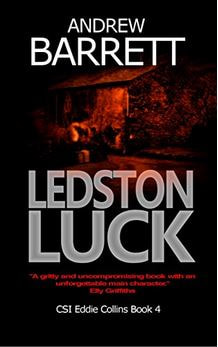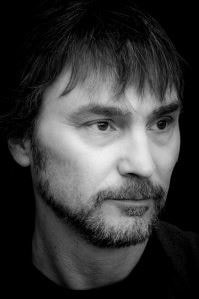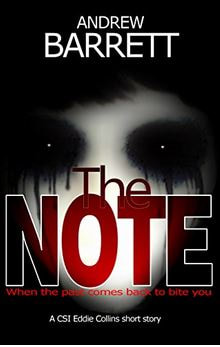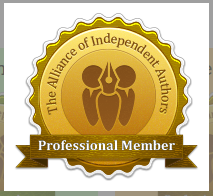|
This week I'm delighted to welcome crime novelist Andrew Barrett to my blog. Andrew has been writing best-selling thrillers since the mid-1990s, all set in northern England. He’s also written several short stories, and co-written a number of television scripts. His stories focus on the world of crime scene investigators, using his own expertise as a senior CSI to develop his fiction. I recently read the fourth book in his Eddie Collins series, 'Ledston Luck'. OK, let's get going with the questions! What inspired the plot for 'Ledston Luck'?  Most writers tend to get going with their stories by asking the 'What If' question. I do too, but with most of my stories, and especially with 'Ledston Luck', first came a couple of scenes. One scene I latched onto as I drove over a canal bridge, was the sight of a woman’s face just beneath the water’s surface. Of course there was no woman there, I’d imagined it, but it looked very real for a moment, and that stuck with me. I wrote a scene around Eddie pulling her from the water. The next scene grew in my mind from a small kernel: I saw a naked woman sitting in a stout wooden chair in a dark farmhouse kitchen. The door opened and in stepped two burglars. The naked woman didn’t scream or run away, she reached for the shotgun next to her. Both of these scenes excited me enough to then ask the 'What If' question, and I slowly constructed a story around them. Tell us what demons drive the angst-ridden Eddie Collins. Eddie Collins is seen by many as angry most or all of the time. But he’s not. He’s just as angry at the man standing next to you in the bus queue noisily chewing on a toffee. What makes Eddie different is that he’s not good at controlling his anger. He’d most likely step away from the toffee-chewer because, if he didn’t, he’d say something that everyone else in the queue would be thinking – and it probably wouldn’t be pleasant. Eddie is not only poor at controlling his feelings, he’s not exactly tactful. He’s an honest, down-to-earth man who really does speak as he sees, and it doesn’t matter if that guy at the bus queue is a street-sweeper, a copper, or Prince Philip, no one is exempt from a Collins tongue-lashing. Eddie is a cuddly bunny if he’s on your side. And all you need in order for him to be on your side is to experience injustice. He hates injustice, whether it’s a victim of murder or someone scratching your car for no good reason. These extremes, and all the other things in between infuriate him; that’s the root of his anger. Tell us about the next book in Eddie's series.Next for Eddie is a novella called 'The Note'. As with all Eddie’s short stories, I write them in first person because I adore the immediacy of it, the relentless onslaught of thought and action. I don’t think I could sustain that through a full novel, but in short story form, it’s so exhilarating. I adore writing Eddie. And I think that’s because I can relate to him so much; he can say the things I feel and get away with them (I can’t, I’ve tried!), and that alone is a wonderfully refreshing experience, so I’ll definitely write more Eddie books. Do you work to an outline or plot or do you go wherever an idea takes you? I have tried to work to an outline. And failed miserably. I find the story tends to grow from an initial scene or two. Having said that, I can recollect two books that benefitted from a bit of planning. 'Stealing Elgar' and 'Ledston Luck' both stalled at around the 100k words and 50k words mark respectively. I could see where I wanted to be at the end, but I couldn’t figure out how to get there. So I made myself stop staring at the cursor, and took out a sheet of paper and a pencil. I managed to draw up a list of scenes that could take me there, and plotted from each scene a consequence, incorporating that consequence into the following scenes until I reached my goal. I finished those books remarkably quickly once I knew exactly what came next. Of course you (I mean me) can’t plan for the unexpected happening while writing a scene, so it’s always good to have written the list in pencil! I wish I could plot a book from page one to page 400 but I can’t. I’ve tried. How long does it take you to write a book to first draft stage?It changes depending on my circumstances. I began 'The Third Rule' in 2004 and finished it in 2012. That was because I took a seven year break from it while I chased a dream of writing for television. I wrote and published 'Black by Rose' inside six months. I’m pretty sure I could never do that again though; it damned near killed me! I should say I can easily write a book and a short in a year, but I don’t think I’d want to do more than that because I’m working full-time (about 60 hours a week), and I’m trying to become more normal. By that I mean that I’m trying to be a good dad, and I’m trying to sample life outside in the real world. I quite like some of it, though if truth be told, I feel more at home inside my head where my characters and my story live. How do you select the names of your characters? Great question. I put a lot of thought into names for central characters, but I usually end up just choosing something that sounds right for that person. I began the first crime book with a central character called Jonathan Benedict. I have no idea where that name came from. But after the first book I disliked it; it felt too wimpish, so I changed it to Roger Conniston, and that gave him (in my eyes) a far more purposeful stance; he had more verve. I got ‘Roger’ from Mr Taylor of Queen (I love Queen), and Conniston from the Lake District (with an extra ‘n’). I took ‘Collins’ from the dictionary at my side because it was nice and easy to say and rolled from the tongue pleasantly when combined with ‘Eddie’ – also chosen because it was short, and I think, because it’s a trustworthy name. In Black by Rose, the bad man was called Slade Crosby. I got ‘Slade’ from HMP Slade. Remember Porridge with Ronnie Barker? Yes, that’s where my Slade came from. And I took ‘Crosby’ from Bing; it’s also a friendly-sounding name that I used for a most evil man because ‘friendly’ and ‘evil’ co-habit often. Most of the other names I choose are simply because they sound right rather than coming from a specially selected source; they fir the character’s time-frame and their social standing. ‘Divine Wright’ from Ledston Luck has a certain religious connotation, and how could a woman who was called Divine turn out to be so evil? Her mother, Lisbeth, was a religious woman, and I figured her own parents would have been too, and whether it’s correct or not, I thought ‘Lisbeth’ sounded religious, and it also sounded Edwardian, which is the time frame they would have grown up in. What kind of research do you do?Absolutely none. Well, no that’s not entirely true. I do research weapons; I had to for 'Stealing Elgar' and 'The Third Rule', and I did a little more in 'Ledston Luck' because I wanted to get a specific shotgun cartridge manufacturer and the details of their cartridge correct. What advice would you give to would-be novelists?If you don’t enjoy it, stop. If you do enjoy it, push everything else aside and do it until your eyes, fingers, and heart bleed. Then do it some more. Thank you, Andrew! Readers can find out more via these links:Website: http://andrewbarrett.co.uk
Twitter: https://twitter.com/AndrewBarrettUK Facebook: https://www.facebook.com/AndrewBarrett.author Instagram: https://www.instagram.com/andrewbarrettauthor Amazon.co.uk: https://goo.gl/Hqps9K Amazon.com: https://goo.gl/nHdV8c
1 Comment
|
Categories
All
Subscribe to my blog!
Via Goodreads
|
Join my Special Readers' group and receive a free copy of 'Blackwater Lake'!
|
Privacy policy Website terms and conditions of use
Copyright Maggie James 2018 - current date. All rights reserved.
Copyright Maggie James 2018 - current date. All rights reserved.
 RSS Feed
RSS Feed
